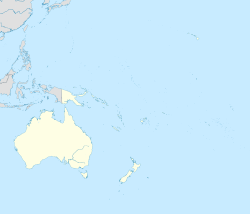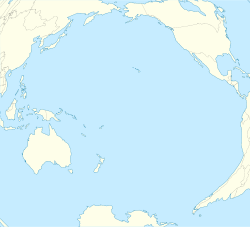
Tokelau is a dependent territory of New Zealand in the southern Pacific Ocean. It consists of three tropical coral atolls: Atafu, Nukunonu, and Fakaofo. They have a combined land area of 10 km2 (4 sq mi). The capital rotates yearly among the three atolls. In addition to these three, Swains Island, which forms part of the same archipelago, is the subject of an ongoing territorial dispute; it is currently administered by the United States as part of American Samoa. Tokelau lies north of the Samoan Islands, east of Tuvalu, south of the Phoenix Islands, southwest of the more distant Line Islands, and northwest of the Cook Islands.
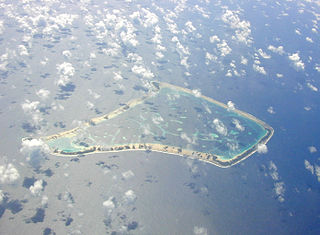
Fakaofo, formerly known as Bowditch Island, is a South Pacific Ocean atoll located in the Tokelau Group. The actual land area is only about 3 km2, consisting of islets on a coral reef surrounding a central lagoon of some 45 km2. According to the 2006 census 483 people officially live on Fakaofo. Of those present 70% belong to the Congregational Church and 22% to the Catholic Church.

The politics of Tokelau takes place within a framework of a parliamentary representative democratic dependency. The head of state of Tokelau is King Charles III in right of his Realm of New Zealand, who is represented by an Administrator. The monarch is hereditary, the Administrator is appointed by the New Zealand Minister of Foreign Affairs and Trade.

The office of head of government of Tokelau, often simply called the Ulu, rotates yearly between the faipule (leaders) of Tokelau's three atolls: Atafu, Fakaofo, and Nukunonu. The current Ulu is Kelihiano Kalolo, the Faipule of Atafu atoll, who has held the position since 6 March 2023.

The Roman Catholic Mission Sui Iuris of Tokelau in Tokelau is a suffragan mission of the Roman Catholic Archdiocese of Samoa-Apia. It was formed in 1992 when the Archdiocese of Samoa-Apia and Tokelau was split into the Archdiocese of Samoa-Apia and the Mission Sui Iuris of Tokelau. The position of Ecclesiastical Superior is currently vacant following the death of Archbishop Alapati Lui Mata’eliga on 25 April 2023.

Parliamentary elections were held in Tokelau on 17 January, 18 January and 19 January 2008 to elect the 20 members of the General Fono. The elections saw Kolouei O'Brien replaced as faipule of Fakaofo by Foua Toloa.

The following outline is provided as an overview of and topical guide to Tokelau:
Falima Teao was the Ulu-o-Tokelau, or head of government, of Tokelau from February 1997 to February 1998. He was also the faipule, or chief head of council, of the atoll of Fakaofo from January 1996 to January 1999. The position of ulu of Tokelau rotates annually between the three faipule, who are elected for terms lasting three years.
Tui Tokelau is a god worshipped in Tokelau in the Pacific. Before the arrival of Christianity in the islands, Tui Tokelau was the primary god along with the usual pantheon of Polynesian gods. The marae of the village of Fakaofo on Fakaofo atoll was the location of a house that contained a monumental coral slab personifying Tui Tokelau, which was covered with beautiful mats. The principal chief (ariki) was the chief priest. During the month of May, all the people of the islands of Tokelau assembled at Fakaofo, and prepared a feast, and prayed to Tui Tokelau to protect them. This ceremony represented the new year. The ceremonial proceedings during May included offerings of fish, coconuts and pandanus drupes. A fire was lit in the temple, and the people danced during the night.
Lalo is an islet of the Fakaofo island group of Tokelau.
Saumatafanga is an islet of the Fakaofo island group of Tokelau.
Fenua Loa is an islet of the Fakaofo island group of Tokelau.
Teafua is an islet of the Fakaofo island group of Tokelau.
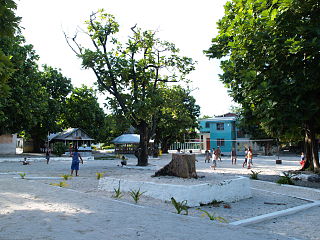
Fenua Fala is an islet of the Fakaofo island group of Tokelau. A settlement Fakaofo was established there in 1960.
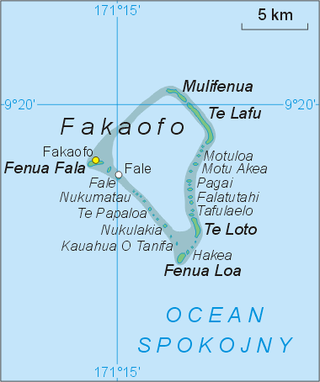
Fale is an islet of the Fakaofo island group of Tokelau. The main settlement in the group is located on the island. As of 2018, 355 people lived on the islet.

Tokelau has two official languages: Tokelauan and English. Over 90% of the population speaks Tokelauan, and just under 60% speak English. Also, 45.8% of the population speak Samoan, and small percentages of the population speak Tuvaluan and Kiribati.
There are three schools in the whole of Tokelau. Each school is located on each of the three atolls. Tialeniu School is on the atoll of Fakaofo, the most southern of the three islands. Matiti School is on Nukunonu, while Matauala School is on the island of Atafu.
Internet in Tokelau is provided by Teletok, the government-owned communications corporation, and Taloha Inc., a private company formed by the Dutch Joost Zuurbier.
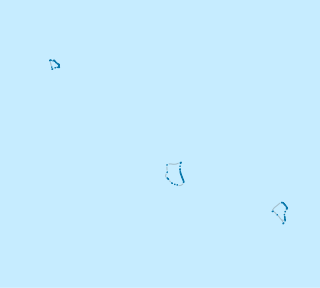
The COVID-19 pandemic in Tokelau is part of the ongoing worldwide pandemic of coronavirus disease 2019 caused by severe acute respiratory syndrome coronavirus 2. Tokelau reported its first confirmed case on 21 December 2022. COVID-19 reached all three of Tokelau's main atolls in July 2023, when the government confirmed the community spread of the virus on Fakaofo, the last atoll without infections.

General elections were held in Tokelau on 26 January 2023.



